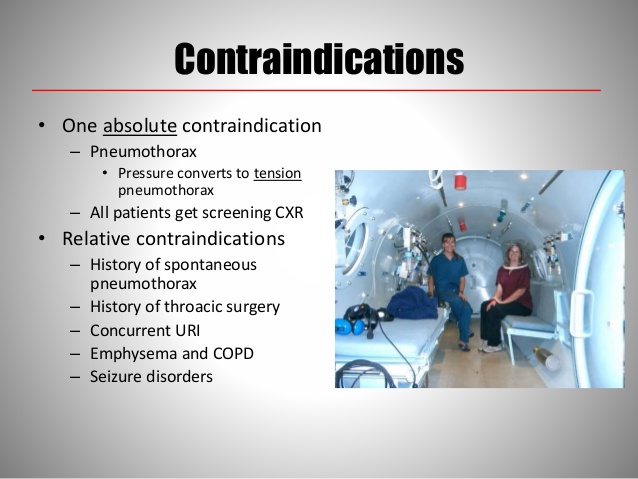
What are the possible risks of Hyperbaric Oxygen Therapy (HBOT)?
Possible risks of Hyperbaric Oxygen Therapy
Possible risks, though rare, include the following:
Barotrauma– As previously noted in an earlier blog, during pressure change. you may experience discomfort in your ears and or sinuses. Whenever a change of pressure occurs, there is the possibility of a small tear in the lung tissue and escape of air into surrounding structures outside of the lungs (pneumothorax). This can occur if the normal passage for air out of the lungs is blocked during depressurization. Slow depressurizations are used in all hyperbaric treatments to minimize this risk. Breathing normally will also aid in the minimization of pulmonary barotrauma. Never hold your breath while receiving HBOT.
Oxygen Toxicity– Breathing 100% oxygen at increased pressure can result in central nervous system oxygen toxicity or pulmonary oxygen toxicity. In order to minimize this risk, treatment is kept within the safe depth range and time frame. If prescribed by the hyperbaric physician, you will breathe room air intermittently. If you should feel any unusual symptoms such as facial twitching, nausea, visual disturbances, or irritability please notify the tender or chamber operator immediately. This can be quickly corrected by incorporating room air into the mono-chamber, or if in the multi-chamber, remove hood or mask to breathe chamber air.
History of Seizures– HBOT may lower the seizure threshold and it may be appropriate to increase medication for patients treated for epilepsy. It is important to share with the hyperbaric physician if you have a history of uncontrolled seizures.
Myopia– This is the most common side effect of HBOT, causing a blurred distant vision or a sudden ability to read without glasses. If this should occur, myopia is resolved within 3 months following the last treatment in most cases. Be sure to inform your eye care doctor that you are currently receiving hyperbaric therapy.
Medications– Certain medication may interfere with HBOT, including Cis-platinum, Disulphiram (Antabuse®), Doxorubicin (Adriamycin®), and Sulfamylon®. Please advise the staff if you are on any of these medications.
Fire Risk– With the use of oxygen in any form there is always an increased risk of fire. We adhere to strict regulations to minimize and prevent hyperbaric related fires. For your safety and the safety of others, please observe all safety regulations and restricted materials list.